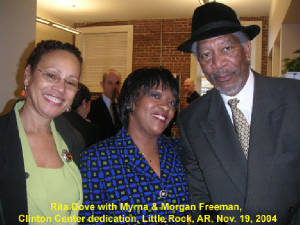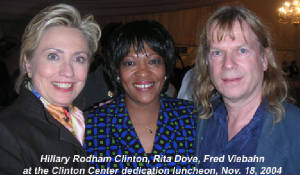|
My Mother Enters the Work Force
The path to ABC Business School
was paid for by a lucky
sign:
Alterations, Qualified Seamstress Inquire Within.
Tested on Sleeves, hers
never puckered -- puffed or sleek,
Leg
o' or Raglan --
they barely needed the damp cloth
to steam them perfect.
Those were the afternoons. Evenings
she
took in piecework, the treadle machine
with its locomotive whir
traveling the lit path of the needle
through quicksand
taffeta
or velvet deep as a forest.
And now and now sang the treadle,
I know, I know....
And
then it was day again, all morning
at the office machines, their clack and chatter
another journey -- rougher,
that
would go on forever
until she could break a hundred words
with no errors -- ah, and then
no more postponed groceries,
and
that blue pair of shoes!
Refer to the Rita, Kelly and Oprah page to see my thoughts on this poem.
Wiring Home
Lest the wolves loose their whistles
and shopkeepers inquire,
keep moving, though your knees
flush
red as two chapped apples,
keep moving, head up,
past the beggar's cold cup,
past
the kiosk's
trumpet tales of
odyssey and heartbreak-
until, turning a corner, you stand,
staring:
ambushed
by a window of canaries
bright as a thousand
golden narcissi.
In this poem there are some really good similies. I don't think this poem neccessarily is
reflecting just getting home but the challenges we face on a daily basis. Sometimes it is hard to just get through day-to-day.When
you finally reach your happy place, after going through tough challenges, it makes it much more worth while.
Golden Oldie
I made it home early, only to get
stalled in the driveway-swaying
at
the wheel like a blind pianist caught in a tune
meant for more than two hands playing.
The words were easy,
crooned
by a young girl dying to feel alive, to discover
a pain majestic enough
to live by. I turned
the air conditioning off,
leaned back to float on a film of sweat,
and listened to her sentiment:
Baby,
where did our love go?-a lament
I greedily took in
without a clue who my lover
might be, or
where to start looking.
I like this poem the most becuase I think anyone can relate,
most of us anyway. I like it because we all get stuck in hard places. As humans our mind wanders from one issue to the next.
One minute you're trying to figure out how to get unstuck and the very next your mind wanders to something totally opposite,
still stuck.
Exit
Just when hope withers, the visa is granted.
The door opens to a street like
in the movies,
clean of people, of cats; except it is your street
you are leaving. A visa has been
granted,
"provisionally"-a fretful word.
The windows you have closed behind
you are turning pink,
doing what they do
every dawn. Here it's gray. The door
to the taxicab waits. This suitcase,
the
saddest object in the world.
Well, the world's open. And now through
the windshield the sky begins to blush
as
you did when your mother told you
what it took to be a woman in this life.
To me a visa granted means that you can go to the place you want. Maybe in this poem the
Visa is a good thing but it is hard to leave everything behind and experience a new way of life. Rita is using al lot of personification
to relate this person's objects to the feelings they are having.
Dusting
Every day a wilderness--no
shade in sight. Beulah
patient among knicknacks,
the solarium a rage
of
light, a "rainstorm
as her gray cloth brings
dark wood to life.
Under her hand scrolls
and crests gleam
darker
still. What
was his name, that
silly boy at the fair with
the rifle booth? And his kiss and
the clear bowl with
one bright
fish, rippling
wound!
Not Michael--
something finer. Each dust
stroke a deep breath and
the
canary in bloom.
Wavery memory: home
from a dance, the front door
blown open and the parlor
in snow, she rushed
the
bowl to the stove, watched
as the locket of ice
dissolved and he
swam free.
That was years before
Father
gave her up
with her name, years before
her name grew to mean
Promise, then
Desert-in-Peace.
Long before the
shadow and
sun's accomplice, the tree.
Maurice.
There are quite a few Rhymes in this poem giving it a good flow. To me this poem is a little
hard to interpret what is going on. Possibly she fell in love with a boy, whoever the woman is that she is speaking of, and
his name was Maurice. She has longed for him even after she has married, maybe she wishes things would have been different
and she wishes she had ened up with him.
Lady Freedom Among Us
don't lower your eyes
or stare straight ahead to where
you
think you ought to be going
don't mutter oh no
not another one
get a job fly a kite
go bury a
bone
with her oldfashioned sandals
with her leaden skirts
with her stained cheeks and whiskers and
heaped
up trinkets
she has risen among us in blunt reproach
she has fitted her hair under a hand-me-down cap
and
spruced it up with feathers and stars
slung over her shoulder she bears
the rainbowed layers of charity and
murmurs
all of you even the least of you
don't cross to the other side of the square
don't think another
item to fit on a
tourist's agenda
consider her drenched gaze her shining brow
she who has brought
mercy back into the streets
and will not retire politely to the potter's field
having assumed the thick skin
of this town
its gritted exhaust its sunscorch and blear
she rests in her weathered plumage
bigboned
resolute
don't think you can ever forget her
don't even try
she's not going to budge
no choice
but to grant her space
crown her with sky
for she is one of the many
and she is each of us
This poem is also hard to interpret what exactly is going on. It is clear that she is speaking
of a woman, possibly a woman that doesn't care what others think, she does her own thing, maybe she has gone through hard
times, we do what we have to do, keep your head high. Rita is trying to show us that this is something we can all relate
to. We may not always do as we please, but Lady freedom lives inside all of us and gives us hope that someday we can be her.
American Modern Poetry
|
 |
 |
 |
 |
|

The House SlaveThe first horn lifts its arm over the dew-lit grass and in the slave quarters there is a rustling- children
are bundled into aprons, cornbread and water gourds grabbed, a salt pork breakfast taken. I watch them driven into
the vague before-dawn while their mistress sleeps like an ivory toothpick and Massa dreams of asses, rum and slave-funk. I
cannot fall asleep again. At the second horn, the whip curls across the backs of the laggards- sometimes my sister's
voice, unmistaken, among them. "Oh! pray," she cries. "Oh! pray!" Those days I lie on my cot, shivering in the early
heat, and as the fields unfold to whiteness, and they spill like bees among the fat flowers, I weep. It is not
yet daylight.
The House Slave can be looked at in a Cultural Approach For interpreting Literature. Cultural
critics look at literature in ways of how the times where and how society was in relation to culture.
This pome reflects the times of the Slaves and shows us how slaves lived in horror
and fear each and every day. They wonder what the will physically be forced to do next and all they can do is hope and pray
for the best.
Weathering OutShe liked mornings the best--Thomas gone to look for work, her coffee flushed with milk outside autumn trees
blowsy and dripping. Past the seventh month she couldn't see her feet so she floated from room to room, houseshoes
flapping, navigating corners in wonder. When she leaned against a door jamb to yawn, she disappeared entirely, Last
week they had taken a bus at dawn to the new airdock. The hangar slid open in segments and the zeppelin nosed forward
in its silver envelope. The man walked it out gingerly, like a poodle, then tied it to a mast and went back inside. Beulah
felt just that large and placid, a lake; she glistened from cocoa butter smoothed in when Thomas returned every
evening nearly in tears. He's lean an ear on her belly and say: Little fellow's really talking, though to
her it was more the pok-pok-pok of a fingernail tapping a thick cream lampshade. Sometimes during the night she
woke and found him asleep there and the child sleeping, too. The coffee was good but too little. Outside everything
shivered in tinfoil--only the clover between the cobblestones hung stubbornly on, green as an afterthought...
In this pome Rita is speaking of a pregnant woman and her excited husband how is extatic. It seems
like a very laid back time for the woman. She uses metaphores and similies to add to the tone of the poem. To me this poem
is saying sometimes we have too much and sometimes we don't have enough- whatever that means to the reader at any point in
someones life, wheather it be pregnancy or times of hardship.
DaystarShe wanted a little room for thinking: but she saw diapers steaming on the line, a doll slumped behind the door. So
she lugged a chair behind the garage to sit out the children's naps. Sometimes there were things to watch-- the
pinched armor of a vanished cricket, a floating maple leaf. Other days she stared until she was assured when she
closed her eyes she'd see only her own vivid blood. She had an hour, at best, before Liza appeared pouting from
the top of the stairs. And just what was mother doing out back with the field mice? Why, building a palace.
Later that night when Thomas rolled over and lurched into her, she would open her eyes and think of the place that
was hers for an hour--where she was nothing, pure nothing, in the middle of the day.
Daystar can be looked at in a Maxsits point of view. Marxsits critics look at literature
in a form of economic and social class status struggles.
In the maxsits point of view the woman being talked about is poor, she has to
dry hang the families clothing, she speaks of mice and this womans only dream is to live in better place having a the often
dreamed about wealthy life style.
Rosa
How she sat there,
the time right inside a place
so wrong it was
ready.
That trim name with
its dream of a bench
to rest on. Her sensible
coat.
Doing nothing was the doing:
the clean flame of her gaze
carved
by a camera flash.
How she stood up
when they bent down to retrieve
her purse. That courtesy.
In this poem she is speaking of Rosa Parks, possibly the time when she refused to give up her bus seat
for a white person. At that time it was uncommon for a balck person let a lone a woman to speak up for themselves. The last
statement seems very sarcastic, as if that was the least they could do.

|
 |
 |
 |
 |
|
|
|





